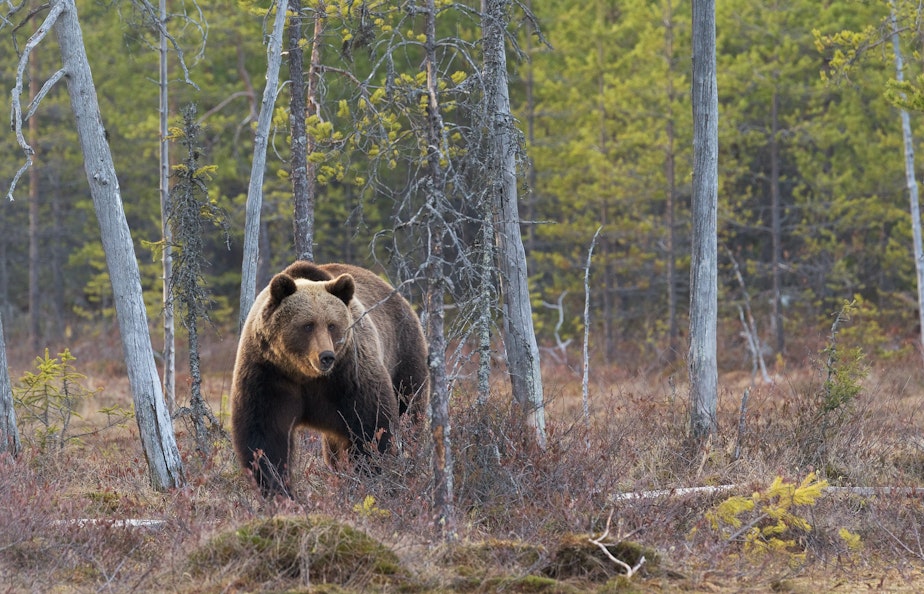Could grizzly bears officially return to the North Cascades?

Humans and grizzly bears have coexisted in the North Cascades for at least 9,000 years, but their relationship has been a rocky one.
When European settlers arrived, they hunted the animals for their fur, and by the mid-1800s, thousands had been killed.
Bear populations dwindled, and the last confirmed grizzly bear sighting in the North Cascades was in 1996.
But that could change.
Earlier this month, The U.S. Fish and Wildlife Service and the National Parks Service announced the restart of possible plans to bring grizzlies back to the region and manage them.
When conservationist Joe Scott heard the news, he felt "guarded optimism."
Sponsored
Scott is the international programs director for Conservation Northwest, a nonprofit focused on restoring local wildlands and wildlife.
"When you work in grizzly bear recovery, especially in the United States, you learn not to get too high or too low, because there's always a surprise around the next corner," Scott said.
Grizzly bear advocates were dealt their last surprise back in 2020, when Secretary of the Interior David Bernhardt ended a different public comment period related to reintroducing grizzlies to the North Cascades.
"There is quite a bit of political baggage I guess you might say around grizzly bear recovery," Scott said. "And so you always have that in the back of your mind when you get an announcement like this."
The political baggage Scott is referring to is pushback the federal government has gotten from lawmakers like Congressman Dan Newhouse (R-WA).
Sponsored
Newhouse is solidly against plans to reintroduce grizzly bears back to the North Cascades, citing potential undue hardships on businesses, families, and agricultural producers.
Jeff Dawson is a rancher in Stevens County, and a district representative for the Washington Cattlemen's Association.
He disagrees with the way the state has handled other animals that are threats to livestock, live wolves. And he's concerned about the potential new threat grizzly bears could pose.
"I am highly concerned what the impact is going to be on our producers in the state of Washington if we bring in grizzly bears and turn them loose," Dawson said. "I mean, we all know they gotta eat something. And I don't believe they're gonna live in the tops of the mountains all the time."
So, what's the plan?
There's a lot to figure out before grizzly bears can begin making the North Cascades home again.
Jason Ransom is helping with that process. Ransom is a wildlife biologist and wildlife program supervisor for the North Cascades National Park Service Complex.
According to Ransom, the North Cascades have been managed as a grizzly bear recovery area since 1997, which means researchers and wildlife managers have been working on the infrastructure to keep bears and humans safely coexisting, should they appear.
But Ransom said all data suggests grizzly bears can't get to the North Cascades on their own. It would take a significant trek for the grizzlies.
"The South Chilcotin range in British Columbia is linearly kind of the closest, but they have metro Vancouver and the Fraser River and a pretty high road density in between here and there," Ransom said.
Sponsored
The federal government still needs to collect comments from the public and draft an Environmental Impact Statement before any grizzlies can make their way back to the North Cascades. It could take until the spring of 2024 to get a final word from federal agencies, Ransom said.
But if grizzlies get the OK to come back to the North Cascades, they'll most likely be flown in from other parts of the country, one at a time via a helicopter, and released far away from people.
For Ransom, the work to bring grizzlies back to the North Cascades is part of a larger effort to restore and heal the damage humans have done to the environment. And while our world faces new challenges due the effects of climate change, he believes grizzlies can play an integral role in protecting the biodiversity of the North Cascades.
"Some species are gonna win, some species you're gonna lose as the climate changes, and we get more fires and shrubs move up in elevation, and all the things that happen. But you've got to have all the species, you have to have all the players in the game in order to have a chance at winning, " Ransom said. "And as far as we know, all the data suggests that grizzly bears are actually climate change winners, and so they can actually be a linchpin that helps things stay together."
The U.S. Fish and Wildlife Service and the National Park Service are accepting public comments until Dec. 14.





